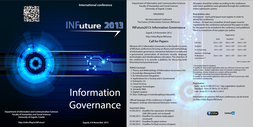Conference Topics
Department of Information and
Communication Sciences
Faculty of Humanities and Social Sciences, Zagreb, Croatia
ORGANISES
4th International Conference
The Future of Information Sciences (INFuture)
INFuture2013: Information Governance
Zagreb, 6-8 November 2013
http://infoz.ffzg.hr/INFuture
INFuture 2013: Information
Governance is the fourth in a series of INFuture conferences focusing on theory
and methodology of information governance, interaction between e-society and
e-government, preservation of electronic records, language technologies and
interdisciplinary education. The objective of the conference is to provide a
platform for discussing both theoretical and practical issues.
TOPICS (in brief):
- 1. Theory and Methodology of Information Governance (IG)
- 2. Knowledge Management (KM)
- 3. EU Infrastructure Integration
- 4. Applications for e-Society and e-Government
- 5. Enterprise 2.0
- 6. Cloud Services
- 7. Language Technologies
- 8. Semantic Web
- 9. Digital Curation
- 10. New Challenges in Interdisciplinary Education
We accept the following paper categories:
- - Research paper - original scientific paper, review, professional paper, preliminary communication (8 to 10 pages)
- Case study (4 to 6 pages)
- Tool demonstration paper (4 to 6 pages)
- Project presentation (2 to 5 pages)
- Student paper - paper whose authors are solely pregraduate or graduate students (4 to 6 pages)
- Poster (1 page summary)
Official language of the conference is English.
Download Call for Papers (PDF)
TOPICS (in detail):
1. Theory and Methodology of Information Governance (IG)
Information management,
Integrated knowledge environment, Information development, Content
relationships, Information excellence, e-Discovery, Agile business
transformation, Information technology governance, Corporate governance, Records
management and information governance, Enterprise content management.
2. Knowledge Management (KM)
3. EU Infrastructure Integration
4. Applications for e-Society and e-Government
5. Enterprise 2.0
6. Cloud Services
7. Language Technologies
8. Semantic Web
9. Digital Curation
10. New Challenges in Interdisciplinary Education
Initiatives in
interdisciplinary education, Innovative learning strategies, Educational systems
design, Education for e-science professionals, Development of digital
preservation curriculum, Information governance education, Enhanced
collaboration, Service based e-learning, e-Learning curriculum, e-Learning
environments, Intelligent tutoring systems, Plagiarism detection, Mobile
learning, e-Learning performance measuring, e-Laboratories, Student
collaboration, Interdisciplinary teaching methods, Quality management
We are also encouraging papers on human-computer interaction, multimedia solutions,
social networks research, advanced solutions for mobile cultural heritage
services, virtual learning environments, cultural heritage management, research
and application of natural language processing techniques, solutions for digital
lexicography, document and record management, digitization of cultural heritage
materials, long-term preservation of digital materials, repositories.
We welcome best practices and business applications in digital archives, libraries etc., and other related domains.



